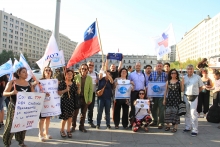Trade unions and social organizations say 'Chile better without TPPA'

By Nayareth Quevedo
Members from different social organizations and trade unions came out on February 4 to the streets to protest against the Trans-Pacific Partnership Agreement, known as TPPA, signed at the same day in New Zealand by 12 countries, including Chile, Mexico, Peru, United States and Canada, which are part of a geographic area that represents 40% of the world Gross Domestic Product (GDP).
The protest, which brought together more than a thousand people, was organized by the organization "Chile Mejor sin TPP" (Chile better without TPPA), and included the participation of public sector trade unions affiliated to the Public Services International (PSI) in Chile.
Raúl Araya, representative of the National Coordinating Committee and member of PSI's Regional Committee, from the judicial sector in this country, said:
"The TPPA not only affects the sovereignty and democracy of Chile, since it will be others who will decide over our laws, but also our rights will be violated by corporations."
In addition, Araya criticized the "secrecy" of the agreement, which has more than 5,000 pages and was made transparent less than three months ago.
On his turn, Esteban Maturana, president of the National Confederation of Municipal Health (CONFUSAM), a PSI affiliate - said:
"The treaty will harm access to medicines because the TPPA will allow large pharmaceutical corporations in the world to set prices, and state enterprises as CENABAST will be transformed into a small or medium business with no ability to compete."
Similarly, Carlos Insunza, representing the National Association of Fiscal Employees (ANEF) and coordinator of the Bureau of Public Sector of CUT ratified:
"Organizations like 'Chile better without TPPA'", which affiliates from PSI are part of, have been raised to denounce the content of this treaty and require Parliament to reject this deal, because it will directly affect the ability of the Chilean State to guarantee its sovereign decisions in relation to the multinationals."
Insunza said that this treaty is tailored for large multinationals, which will ensure their profits and not the needs of the citizens of a country and its autonomous decisions.
Representatives of PSI affiliates in Chile added that this agreement not only restrict national sovereignty and raise the prices of medicines, but attempt against food sovereignty, threaten human rights, alter the internal rules and limit the Constitution of the country.
The nations which have signed the TPPA are United States, Canada, Japan, Australia, New Zealand, Singapore, Malaysia, Brunei, Vietnam, Chile, Mexico and Peru.
Now, each State shall have a period of two years to ratify the agreement in their respectives Parliaments. The TPPA will enter into force 60 days after completion of the internal procedures in each country member.
If this not happens in the next 24 months, TPPA also takes effect at the expiration date, if at least six of the adherents represent 85% of the combined GDP of the block. In other words, it needs just the rich countries approval.

